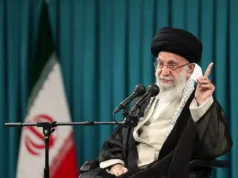American financial regulators announced on Wednesday they had reached a settlement with Deutsche Bank worth $258 million for violating U.S. sanctions between 1999 and 2006. The penalty comes as Congress considers new measures that could allow the victims of terrorism to earn compensation from such fines.
Germany’s largest bank processed 27,200 transactions worth $10.9 billion using “non-transparent methods and practices” to hide or remove information about the countries involved in the money transfers, U.S. officials said. The method allowed customers, including Iran, Syria, Libya and Sudan, to subsequently avoid scrutiny from officials at the Treasury’s Office of Foreign Assets Control (OFAC). An investigation showed the practice was widespread and not unique to a specific department. One bank manager described it as a “lucrative” business.

Deutsch Bank headquarters in Germany. (Photo: AFP) (Photo: Sylvan Lane). |
According to the New York Department of Financial Services (NYDFS), Deutsche Bank also agreed to fire six employees and appoint an independent monitor to oversee certain operations. Some of the employees responsible for the deception already left the company. NYDFS will receive $200 million, with $58 million going to the U.S. Federal Reserve.
Other major European banks have recently faced similar penalties for processing business transactions on behalf of blacklisted governments. Last month, French firm Credit Agricole agreed to pay $787 million to regulators for violating sanctions by illicitly transferring $32 billion through its New York branch between 2003 and 2008. In 2014, BNP Paribas pled guilty in court and agreed to pay a $9 billion fine for violating the Trading with the Enemy Act and other statutes when it engaged with embargoed countries, including Iran. Commerzbank, Credit Suisse, HSBC, Barclays, and Standard Chartered have all paid fines over the past few years in response to similar allegations, while investigations into Societe Generale and UniCredit remain ongoing.
Also on Wednesday, a Senate Judiciary Subcommittee held hearings on how Congress could ensure compensation for the victims of terrorism, specifically Iranian and Palestinian facilitated attacks. Attorneys and victims’ advocates testified that legislators should enact laws that would earmark funds from sanctions violation fees to those affected by terrorism. Other options include attaching a rider that would automatically be added to future settlements with firms that evade sanctions on regimes that sponsor terrorism. Iran owes $45 billion to the victims of terrorism and their family plaintiffs from court-awarded damages in 86 cases. But with the release of some frozen assets enshrined in the recent Joint Comprehensive Plan of Action (JCPOA), Americans affected by officially sanctioned violence still wonder how they will ever be compensated for their pain and losses.





